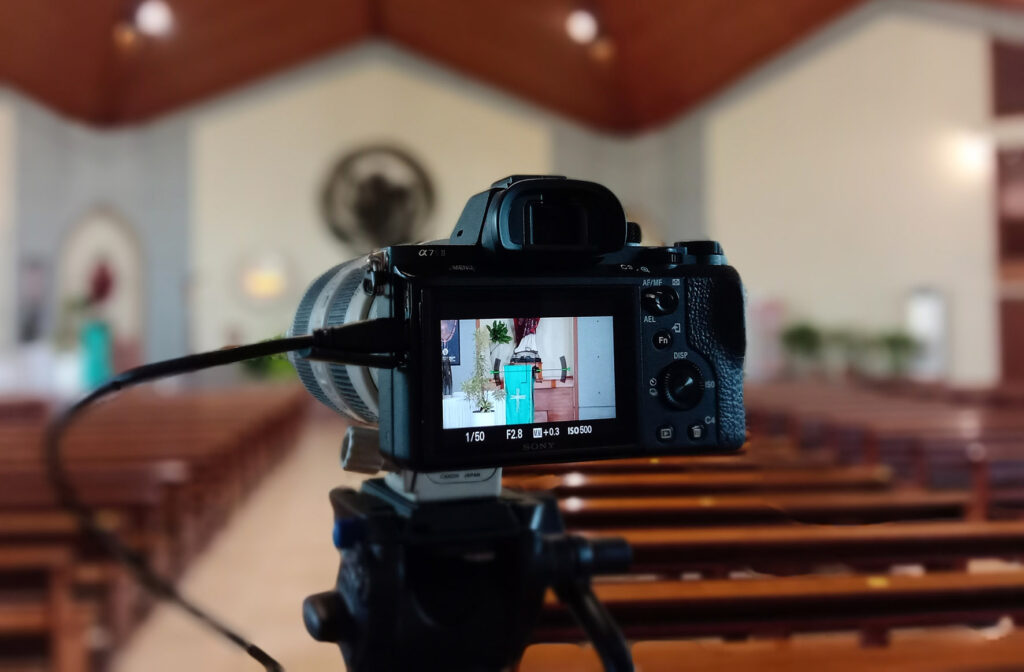How real is virtual religion?
Could you forego a non-Christian baptism in a computer game? For Breen Malmberg, the answer was no. Therefore, he asked for a refund for the game Bioshock Infinite[1], a first-person shooter game that criticises nationalism and connecting religion to nationalistic aims[2]. To play the game at all, the player has to take an in-game baptism. As a Christian, Malmberg found the act to be blasphemous, and was eventually granted a refund.[3] So, how real is virtual religion?
Reality vs. virtual reality
But is a virtual baptism real? In order to answer that question, one has to dive into the nature of reality. The Cambridge Dictionary’s definition of reality is “the state of things as they are, rather than as they are imagined to be.”[4] The problem with this definition is, though, that for us humans it seems rather impossible to find one common understanding of how things actually are, as we are bound to our own perceptions of reality.[5] Our brain processes the information we get from the physical reality and projects our own cultural and personal understanding of reality into that perception.[6]
Virtual reality (VR) is, of course, part of our reality. Virtual reality is made of code and graphics, that the player sees as a world they enter. In the real world, our brain constructs our image of reality from the input of all the five human senses. In virtual reality, the world is only made of sight and sound, but modern technology such as VR glasses can make it seem very real. Like reality, VR also has a history of happenings and social networks of people who might not share a physical space, but still can develop deep and meaningful relationships in a shared virtual space. Consequently, VR has many similarities to living in the real world. Virtual reality can transmit sight, sound, thoughts, and emotions, but what it lacks is touch, taste, and smell, which are still very difficult for technology to mimic.
Virtual holy places
Second Life is one of the oldest virtual worlds, where the player can ‘live’ in an open-ended world, create a personal avatar, build their own houses, and interact with other avatars. Early on, players began to bring their religious practices to the world.[7] There is, for example, an Anglican Cathedral with an active congregation led by an Anglican pastor.[8] The world also contains sacred spaces for other religions, such as a virtual Stonehenge for Wiccans and a replica of Mecca. However, different traditions handle the idea of a virtual sacred space differently. The Anglican and Wiccan communities of Second Life are open to the idea of a virtual sacred space, but the Muslim community has clearly stated that the virtual Mecca is not sacred, even though players of the world sometimes act as if it is.[9]
VR glasses have brought a whole new level of immersiveness to virtual reality, and some religious communities have already found ways to use them. In the Helsinki Cathedral in Finland, tourists can rent VR glasses to visit the bell tower in virtual reality.[10] In addition, Oculus VR glasses have their own Christian prayer garden game.[11] The VR Church takes virtual reality church even further, as their congregation meets only in virtual reality and for some it is their only church.[12] For those who are physically disabled in a way that prohibits them to attend a physical church, attending a church in virtual reality might be the only option[13]. The VR Church also has a missiological emphasis to reach the gamer community.[14]
The value of the physical world
It seems that there are religious practices that are more easily transferred to virtual reality than others. Personal contemplation like Buddhist meditation; practices based on social connections like Bible study groups; and practices using visual aids such as Catholic stations of the cross are easier to adapt to virtual reality than practices that emphasise the importance of touch or physical world.
Virtual reality makes religious communities ponder the meaning of the physical world in a new way. Different theology will also lead to different outcomes. For example, the Orthodox and Catholic Churches believe that in the Eucharist the bread and wine are actually transformed into the flesh and blood of Jesus.[15] Thus, Communion without physical substances could not work. However, some Protestant denominations consider the Eucharist to be purely a symbolic presentation of the body and blood of Jesus Christ. For most Protestant pastors the idea of a virtual Eucharist, or baptism, would still be quite uncomfortable. But some, like the aforementioned VR Church, take the idea of purely symbolistic nature of Eucharist and Baptism as far as having virtual sacraments.[16] Some Christians have criticised them for Gnosticism, an old heresy that values the spirit over the physical body, as the VR Church seems to dismiss the value of the physical body when it bypasses the human need for physical touch and presence.[17]
Theology of VR
Religious groups in virtual reality were a marginal phenomenon before the coronavirus pandemic. But, they have made other religious groups think of how they perceive the importance of the physical world and the reality in virtual reality. Behind these practical matters of online religious meetings lie huge philosophical questions about the importance of physical reality and physical presence in religious practices. They also bring to the surface the differences in how traditions value mind and body. Virtual reality will surely give future theologians and religious traditions many new questions to ponder. Is a baptism in a computer game real? Does online presence make a real community? Could the words of a pastor consecrate bread and wine through the internet? Is it possible for a pastor to pray for the sick through a Skype call, or is physical touch vital in prayer for healing?
Pietari Hannikainen and Meri Hannikainen
Would you like to stay updated on religion and society? Visit the EARS Dashboard.
[1] Some Don’t Like BioShock’s Forced Baptism. Enough To Ask For A Refund.
[2] Columbian Nightmare: Narrative, History, and Nationalism in Bioshock Infinite
[3] Some Don’t Like BioShock’s Forced Baptism. Enough To Ask For A Refund.
[4] REALITY | meaning in the Cambridge English Dictionary
[6] The Amazing Ways Your Brain Determines What You See
[8] The Anglican Cathedral of Second Life
[9] Virtuaalinen tila pyhänä tilana : Pyhän tilan mahdollisuus virtuaalimaailma Second Lifessa
[10] Kiinnostaako kiivetä Tuomiokirkon kupoliin? – Nyt sen voi tehdä virtuaalisesti
[11] Strapping on the Sacred: When Religion Enters Virtual Reality
[13] The church that isn’t shutting its doors
[15] Huomioita ortodoksisesta ehtoolliskäsityksestä
[16] This Pastor Is Putting His Faith in a Virtual Reality Church






